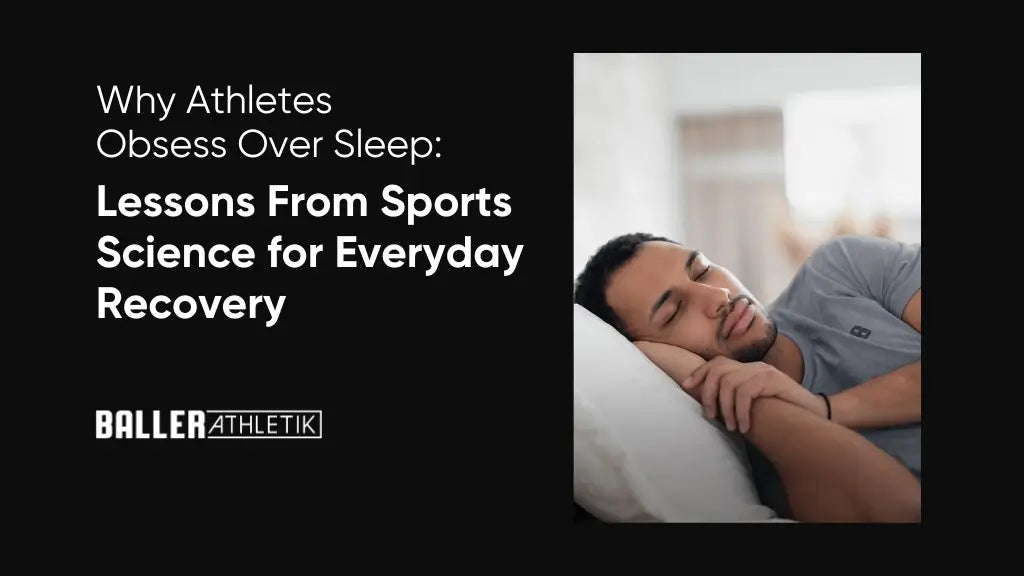When you think of elite athletes, you probably picture grueling workouts, strict diets, and endless hours of training. But ask any top performer what their real secret weapon is, and you’ll hear the same answer: sleep.
LeBron James reportedly sleeps 10–12 hours a night. Roger Federer prioritizes at least 9 hours plus naps. Usain Bolt swore by his pre-race naps before breaking world records. Sleep isn’t just rest—it’s the foundation of peak performance.
The fascinating part? The same science that drives athletes to obsess over sleep applies to all of us. Whether you’re chasing gold medals or juggling a 9–5 job, sleep could be the most powerful recovery tool you’re ignoring. Pairing it with comfortable sleepwear for men or sleepwear for women can make this even more effective.
Why Sleep Matters More Than You Think
Sports science shows that sleep is not a passive state—it’s an active recovery system. While we snooze, the body runs critical repair programs that impact both physical and mental performance.
Muscle Recovery & Growth
During deep sleep, the body releases growth hormone, which repairs muscle tissue and strengthens bones. For athletes, this means faster recovery from training. For everyday people, it means healthier muscles and less soreness after exercise or even daily activity. Wearing supportive sleepwear for men or a sleep vest for men can further enhance comfort and relaxation for quality sleep.
Cognitive Function & Reaction Time
Sleep deprivation slows reaction time as much as alcohol intoxication. In high-stakes sports, a fraction of a second makes the difference between winning and losing. In everyday life, this affects productivity, decision-making, and even safe driving.
Injury & Illness Prevention
Studies reveal that athletes sleeping fewer than 8 hours are almost twice as likely to get injured. Similarly, poor sleep weakens the immune system, making us more vulnerable to colds, flu, and chronic health issues.
Emotional & Mental Resilience
Sleep resets our nervous system. Athletes under constant pressure rely on it to manage stress and anxiety. For everyone else, it helps stabilize mood, improve focus, and maintain emotional balance. Comfortable sleepwear for women can also improve relaxation and sleep quality.
Lessons Everyday People Can Steal From Athletes
You don’t need a million-dollar contract or a professional coach to apply these principles. Here are science-backed recovery strategies athletes use—and how you can adapt them.
1. Stick to a Routine
Athletes go to bed and wake up at consistent times, even on weekends. This trains the body’s circadian rhythm for deeper, more restorative sleep.
Everyday adaptation: Set a fixed bedtime and wake-up alarm. Even consistency within 30 minutes can make a difference.
2. Optimize Your Sleep Environment
Dark, cool, and quiet rooms are the gold standard for elite athletes. Some even travel with blackout curtains or noise machines.
Everyday adaptation: Keep your bedroom between 18–20°C, invest in blackout blinds, or use earplugs if needed.
3. Digital Detox Before Bed
Blue light from phones and laptops delays melatonin release, making it harder to fall asleep. Many athletes cut screens an hour before bedtime.
Everyday adaptation: Replace late-night scrolling with light reading, journaling, or meditation.
4. Nutrition & Hydration Tweaks
Heavy meals, caffeine, and alcohol late in the day disrupt sleep quality. Athletes carefully time their nutrition to support recovery.
Everyday adaptation: Avoid caffeine after 3 p.m., eat lighter dinners, and stay hydrated—but taper water intake before bed.
5. Naps as Performance Boosters
Short power naps help athletes recharge without disrupting nighttime sleep.
Everyday adaptation: A 20-minute nap during the day can boost alertness and productivity if you’re sleep-deprived.
Athlete vs. Everyday Sleep Strategies
| Athlete’s Recovery Strategy | Everyday Person’s Adaptation |
|---|---|
| 9–12 hours of sleep + naps | 7–9 hours + short power naps |
| Strict bedtime & wake-up | Consistent sleep schedule |
| Sleep in pitch-black, soundproof rooms | Dark, cool, quiet bedroom |
| Monitored nutrition & no late caffeine | Avoid caffeine after 3 p.m., light dinner |
| Screen-free evenings | Reduce screen time 30–60 min before bed |
Final Takeaway
Athletes treat sleep like training because it directly impacts their performance, recovery, and longevity. The good news? You don’t need to run marathons or lift heavy weights to benefit from the same principles.
By prioritizing high-quality sleep, you’ll notice sharper focus, better energy, fewer aches, and a stronger immune system. In short: sleep is not a luxury—it’s your ultimate recovery tool.

